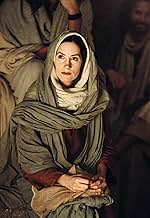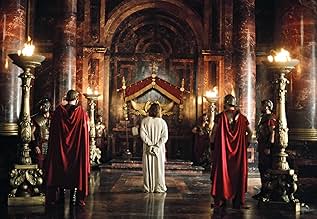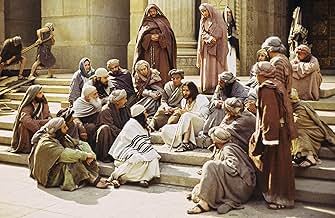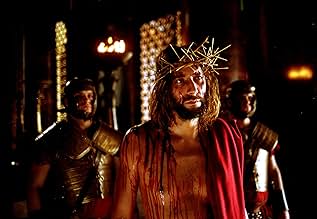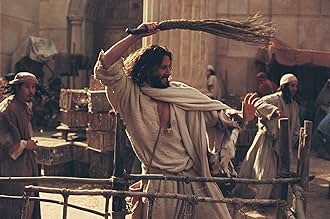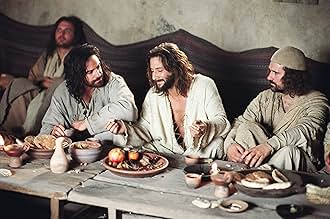CALIFICACIÓN DE IMDb
7.7/10
4.5 k
TU CALIFICACIÓN
La historia de la vida de Jesús narrada por el apóstol Juan, narrada por Christopher Plummer.La historia de la vida de Jesús narrada por el apóstol Juan, narrada por Christopher Plummer.La historia de la vida de Jesús narrada por el apóstol Juan, narrada por Christopher Plummer.
- Premios
- 1 premio ganado y 3 nominaciones en total
Paul Alexander Nolan
- Bridegroom
- (as Paul Nolan)
Heinar Piller
- High Official #3
- (as Heinar Pillar)
- Dirección
- Guionista
- Todo el elenco y el equipo
- Producción, taquilla y más en IMDbPro
Opiniones destacadas
Henry Ian Cusick does a fantastic job of capturing the kindhearted, casual, loving Jesus any of us would want as our friend. It reminds me of that drawing of Christ laughing!
In some of the older portrayals, Jesus comes off as wooden, isolated and somehow above everyone else. Not here! Jesus smiles at others' limited understandings, but with compassion, as if he wants to teach them something by his very presence.
The best special effect had to be the walking on the water. Beautiful photography throughout - Filmed in and near Malaga in Spain, it does Jerusalem and Israel proud!
Please consider inviting your friends to see this film. It has so much to offer and it gets the point across - Jesus is the Savior of the world!
In some of the older portrayals, Jesus comes off as wooden, isolated and somehow above everyone else. Not here! Jesus smiles at others' limited understandings, but with compassion, as if he wants to teach them something by his very presence.
The best special effect had to be the walking on the water. Beautiful photography throughout - Filmed in and near Malaga in Spain, it does Jerusalem and Israel proud!
Please consider inviting your friends to see this film. It has so much to offer and it gets the point across - Jesus is the Savior of the world!
I have seen all the Jesus movies and all are a little bit too stylized. This movie I felt was real. It is verbatim, and it shows what the day to day living was like for Jesus and his times. I especially liked the carpenter scene. I have always believed that Jesus was as an ordinary man until the time was right. That he would have had to work for a living. That he would have fulfilled all of his father's commands, including the one which state that we had to toil for our bread. I felt the frustration but loving patience of our Lord, as he tried to convince his people, the Jews, that he was the one and that their hour was now. He succeeded in splitting the Jews into believers and non-believer and that condition exist to this day not only for them but for all who hear the message. Jesus is personal and approachable. I am looking forward to the PASSION, since this movie is about the last 12 hours of Jesus's life amongst us. To be told in a 3 hour movie also. I just hope the Gospels are all made an illustrated with the beauty, simplicity, faithfulness and Love of this movie.
There are four gospels in the New Testament. Matthew, Mark and Luke are referred to as the `synoptic' gospels. They see Jesus `with the same eye'. Their `eyewitness accounts' are remarkably alike. John is startlingly different in its details, style and tone -- so much so, that this gospel almost didn't make it into the accepted canon of New Testament books.
`The Gospel of John' purports to be a faithful retelling of the fourth gospel. It employs every single word of the text, as rendered by the Good News Bible translation. The film combines dialogue with narration by veteran actor Christopher Plummer. The result is an understandably wordy script. One of my friends used the term `verbose'.
Was it wise or foolish to adopt this approach? That depends on your point of view. It means that the actor playing Jesus must deliver lengthy speeches, especially Jesus' farewell after the Last Supper. This runs the risk of being a deadly bore in cinematic terms. I must confess, I kept nodding off during this segment of the film. To his credit, the director tries to compensate by cutting away to a montage of black-and-white flashback images suggested by Jesus' words. This gives the audience a much-needed visual breather.
On the other hand, and this is a good thing, using the integral text of John's gospel obliges us truly to listen -- to hear the Word. I lost track of how often Jesus said, `I am telling you the truth.' Some might find this annoyingly repetitive. But it certainly hammers home the theme of John's gospel. As if in counterpoint to Pilate's cynical barb, `What is truth?' we have Jesus' ringing declaration, `I am the Truth!' (This is often obscured by older translations, such as `Amen, amen, I say to you'.)
I found `The Gospel of John' highly instructive, not just for what it says, but what is does not say. I realized, for the first time, why John recounts events absent from Matthew, Mark and Luke, while ignoring those familiar to us from their accounts. It struck me that the author of the fourth gospel assumes we are already conversant with all this material. For instance, John does not describe the institution of the Eucharist at the Last Supper, yet abounds in references to bread and wine. Again, John does not tell us what became of John the Baptist (he was beheaded by Herod) or Judas the traitor (he hanged himself). John takes it for granted that we know.
I also realized how often Jesus says, `I am who I am' (three times) and finally, `Before Abraham was, I am.' Jesus applies to Himself the phrase used by Yahweh in the Old Testament as His name. In other words, in John's gospel, Jesus clearly equates Himself with God (`The Father and I are one').
As represented in this film, Jesus is thoroughly human in that He suffers and dies. Yet He also radiates the power of divinity -- not so much in the form of miracles, as in a sense of righteousness, a certainty about His mission. Even Jesus' outrage at the commercialization of Temple worship seems more like the fulmination of an exasperated Old Testament God. We do not see Jesus tempted by Satan or agonizing in the garden of Gethsemane. Jesus knows exactly who He is and what He is doing, even though His followers may not.
The real `stars' of the film are Jesus' opponents, `the Jewish authorities' (Pharisees, Sadducees and scribes) and their hapless instrument, Pontius Pilate. The apostles, on the other hand, are curiously lifeless in this film rendering of John's gospel. Even Judas is given little in the way of motivation. John's explanation is that he was a thief who pilfered the apostles' common purse and sold His master out of simple greed. This explanation may have been enough for the evangelist, but it is far from satisfying in literary or cinematic terms.
The film portrays Mary, the mother of Jesus, as a woman of mature years. Her visual representation comes as something of a shock, compared to Olivia Hussey's incarnation of the Virgin in `Jesus of Nazareth'. I was reminded of Michelangelo's Pietà. Someone pointed out to the sculptor that the mother looked strangely younger than the son. Michelangelo replied that, since the Virgin had been pure and sinless, he could not imagine her aging and decaying. Jesus' mother in `The Gospel of John' thus runs counter to a certain iconographic tradition.
The other women in this film, as in John's gospel, get short shrift. We barely get any sense of Mary Magdalen, or Mary and Martha of Bethany. The most fully developed female character is the Samaritan at the well, played by an actress whose face and voice deliver exactly the right note of hard-bitten cynicism. One only wishes she were not so wild-eyed once she realizes she is speaking to the promised Messiah.
The same excessive theatricality is found in John the Baptist, Nathanael (whom Jesus saw beneath the fig tree before meeting him) and doubting Thomas (whose exclamation, `My Lord and my God!' rings hollow).
A film such as `The Gospel of John' cannot be judged entirely according to the usual canons of cinematic art. In other words, we cannot judge `The Gospel of John' simply on the basis of artistic merit or entertainment value. Ultimately, we must ask: Is the film theologically sound? Does it succeed in conveying the gospel message? How do we, the audience, respond to that message and especially the messenger, Jesus Himself?
In the final analysis -- and this is a question all filmgoers must answer for themselves -- would we heed the Jesus of `The Gospel of John' when He invites us to `Follow me'?
`The Gospel of John' purports to be a faithful retelling of the fourth gospel. It employs every single word of the text, as rendered by the Good News Bible translation. The film combines dialogue with narration by veteran actor Christopher Plummer. The result is an understandably wordy script. One of my friends used the term `verbose'.
Was it wise or foolish to adopt this approach? That depends on your point of view. It means that the actor playing Jesus must deliver lengthy speeches, especially Jesus' farewell after the Last Supper. This runs the risk of being a deadly bore in cinematic terms. I must confess, I kept nodding off during this segment of the film. To his credit, the director tries to compensate by cutting away to a montage of black-and-white flashback images suggested by Jesus' words. This gives the audience a much-needed visual breather.
On the other hand, and this is a good thing, using the integral text of John's gospel obliges us truly to listen -- to hear the Word. I lost track of how often Jesus said, `I am telling you the truth.' Some might find this annoyingly repetitive. But it certainly hammers home the theme of John's gospel. As if in counterpoint to Pilate's cynical barb, `What is truth?' we have Jesus' ringing declaration, `I am the Truth!' (This is often obscured by older translations, such as `Amen, amen, I say to you'.)
I found `The Gospel of John' highly instructive, not just for what it says, but what is does not say. I realized, for the first time, why John recounts events absent from Matthew, Mark and Luke, while ignoring those familiar to us from their accounts. It struck me that the author of the fourth gospel assumes we are already conversant with all this material. For instance, John does not describe the institution of the Eucharist at the Last Supper, yet abounds in references to bread and wine. Again, John does not tell us what became of John the Baptist (he was beheaded by Herod) or Judas the traitor (he hanged himself). John takes it for granted that we know.
I also realized how often Jesus says, `I am who I am' (three times) and finally, `Before Abraham was, I am.' Jesus applies to Himself the phrase used by Yahweh in the Old Testament as His name. In other words, in John's gospel, Jesus clearly equates Himself with God (`The Father and I are one').
As represented in this film, Jesus is thoroughly human in that He suffers and dies. Yet He also radiates the power of divinity -- not so much in the form of miracles, as in a sense of righteousness, a certainty about His mission. Even Jesus' outrage at the commercialization of Temple worship seems more like the fulmination of an exasperated Old Testament God. We do not see Jesus tempted by Satan or agonizing in the garden of Gethsemane. Jesus knows exactly who He is and what He is doing, even though His followers may not.
The real `stars' of the film are Jesus' opponents, `the Jewish authorities' (Pharisees, Sadducees and scribes) and their hapless instrument, Pontius Pilate. The apostles, on the other hand, are curiously lifeless in this film rendering of John's gospel. Even Judas is given little in the way of motivation. John's explanation is that he was a thief who pilfered the apostles' common purse and sold His master out of simple greed. This explanation may have been enough for the evangelist, but it is far from satisfying in literary or cinematic terms.
The film portrays Mary, the mother of Jesus, as a woman of mature years. Her visual representation comes as something of a shock, compared to Olivia Hussey's incarnation of the Virgin in `Jesus of Nazareth'. I was reminded of Michelangelo's Pietà. Someone pointed out to the sculptor that the mother looked strangely younger than the son. Michelangelo replied that, since the Virgin had been pure and sinless, he could not imagine her aging and decaying. Jesus' mother in `The Gospel of John' thus runs counter to a certain iconographic tradition.
The other women in this film, as in John's gospel, get short shrift. We barely get any sense of Mary Magdalen, or Mary and Martha of Bethany. The most fully developed female character is the Samaritan at the well, played by an actress whose face and voice deliver exactly the right note of hard-bitten cynicism. One only wishes she were not so wild-eyed once she realizes she is speaking to the promised Messiah.
The same excessive theatricality is found in John the Baptist, Nathanael (whom Jesus saw beneath the fig tree before meeting him) and doubting Thomas (whose exclamation, `My Lord and my God!' rings hollow).
A film such as `The Gospel of John' cannot be judged entirely according to the usual canons of cinematic art. In other words, we cannot judge `The Gospel of John' simply on the basis of artistic merit or entertainment value. Ultimately, we must ask: Is the film theologically sound? Does it succeed in conveying the gospel message? How do we, the audience, respond to that message and especially the messenger, Jesus Himself?
In the final analysis -- and this is a question all filmgoers must answer for themselves -- would we heed the Jesus of `The Gospel of John' when He invites us to `Follow me'?
I read about "The Gospel of John" in the newspapers, and the first thing that crossed my mind was, "Why another Jesus movie?" With "The Passion" coming just around the corner, "The Gospel of John" seemed a bit overshadowed by all of the hype Mel Gibson's movie was getting. Still, I did my research, being a fan of Jesus movies, and found some pretty good reviews. I still didn't expect it to be as good as it was, and as soon as I popped the DVD into my TV I was mesmerized for the entire three hours of the movie.
Henry Ian Cusick is absolutely amazing in his role of Jesus Christ. His only competition would be Robert Powell of "Jesus of Nazareth", but Cusick's performance was unlike any I'd seen before (and I've seen "Jesus" the miniseries with Jeremy Sisto, "Jesus" with Brian Deacon, "Matthew" with Bruce Marchiano, "The Greatest Story Ever Told" with Max Von Sydow, "King of Kings" with Jeff Hunter, "The King of Kings" with H.B. Warner, "Jesus of Nazareth" with Robert Powell, and both versions of "Jesus Christ Superstar"). His potrayal of Christ is absolutely effortless, which is even more impressive considering the fact that he's speaking word for word from the book of John. Not only does he do wonders with the script, but his overall interpretation of Jesus is unique and, for me, very inspiring. Cusick's Christ knows his mission and carries it out with determination, and, most of all, authority; but this doesn't hold back his human side either, and he is very believable as a loving, caring Christ (the single tear running down his face during the raising of Lazarus was so touching and convincing that it made ME cry). Some may believe that his attitude toward the Pharisees was harsh, and I'll admit that I was a bit taken back when he raised his voice more than once throughout the movie-- but as it progresses, his emotions seem appropriate for someone desperately trying to teach a message of salvation that no one seems to want to accept.
The special effects were very well-done. The scene where Jesus is walking on the water is finally convincing...
The only problem I had with the movie was that it seemed to shy away from the crucifixion. I was a bit disappointed at the way the movie zipped through one of the most crucial parts of the Gospel, especially with Cusick's passionate performance throughout the first couple of hours of the movie. The end result is about two hours and thirty minutes of beautiful cinematography and brilliant acting, and a really "blah" finale. The directors really missed the chance to make an impression by failing to utilize the most dramatic part of Christ's life. Cusick could have worked wonders with it.
As for the rest of the cast, each member was perfect. Even the minor roles were believable-- the Pharisees and the people on the street gave very in-depth, and occassionally passionate, performances.
"The Gospel of John" was one of the best potrayals of Christ I have ever seen. I highly recommend it, and just a heads up--the "Special Features" addition to the DVD set is a great bonus!
Henry Ian Cusick is absolutely amazing in his role of Jesus Christ. His only competition would be Robert Powell of "Jesus of Nazareth", but Cusick's performance was unlike any I'd seen before (and I've seen "Jesus" the miniseries with Jeremy Sisto, "Jesus" with Brian Deacon, "Matthew" with Bruce Marchiano, "The Greatest Story Ever Told" with Max Von Sydow, "King of Kings" with Jeff Hunter, "The King of Kings" with H.B. Warner, "Jesus of Nazareth" with Robert Powell, and both versions of "Jesus Christ Superstar"). His potrayal of Christ is absolutely effortless, which is even more impressive considering the fact that he's speaking word for word from the book of John. Not only does he do wonders with the script, but his overall interpretation of Jesus is unique and, for me, very inspiring. Cusick's Christ knows his mission and carries it out with determination, and, most of all, authority; but this doesn't hold back his human side either, and he is very believable as a loving, caring Christ (the single tear running down his face during the raising of Lazarus was so touching and convincing that it made ME cry). Some may believe that his attitude toward the Pharisees was harsh, and I'll admit that I was a bit taken back when he raised his voice more than once throughout the movie-- but as it progresses, his emotions seem appropriate for someone desperately trying to teach a message of salvation that no one seems to want to accept.
The special effects were very well-done. The scene where Jesus is walking on the water is finally convincing...
The only problem I had with the movie was that it seemed to shy away from the crucifixion. I was a bit disappointed at the way the movie zipped through one of the most crucial parts of the Gospel, especially with Cusick's passionate performance throughout the first couple of hours of the movie. The end result is about two hours and thirty minutes of beautiful cinematography and brilliant acting, and a really "blah" finale. The directors really missed the chance to make an impression by failing to utilize the most dramatic part of Christ's life. Cusick could have worked wonders with it.
As for the rest of the cast, each member was perfect. Even the minor roles were believable-- the Pharisees and the people on the street gave very in-depth, and occassionally passionate, performances.
"The Gospel of John" was one of the best potrayals of Christ I have ever seen. I highly recommend it, and just a heads up--the "Special Features" addition to the DVD set is a great bonus!
I have seen "King of Kings", "The Greatest Story Ever Told", "Jesus of Nazareth", "The Jesus Film", "Jesus Christ, Superstar", and now, "The Gospel According to John." This, to me, is the most scriptural presentation so far. The acting was superb considering the actors had to contend with a dialogue that was taken straight out of the Bible. The actor who portrayed Jesus (Cusick) gave a very refreshing portrayal of Jesus, the man. I especially liked it when he smiled! I remember Max von Sydow's and Robert Powell's portrayal of Jesus and they were too "somber"...
It seemed like I was reading the Gospel of John while watching the film. Though the movie was quite long (the gospel account has 21 chapters!),I was never bored.
It seemed like I was reading the Gospel of John while watching the film. Though the movie was quite long (the gospel account has 21 chapters!),I was never bored.
¿Sabías que…?
- TriviaThe dialog follows the Good News Bible, word for word, in sequential order from beginning to end.
- ErroresAfter Jesus performs his first miracle of turning the water into wine at the wedding feast, he pours the wine into what appears to be a plastic cup (to help us see the color of what was water). Actually, colorless glass has been around since approximately the 9th century BC.
- Citas
Jesus Christ: A person who has had a bath needs only to wash his feet; his whole body is clean, and you are all clean, all except one.
- ConexionesFollows The Visual Bible: Matthew (1993)
- Bandas sonorasSymphony No.5
Music by Valentin Silvestrov
Performed by The Ural Philharmonic Orchestra
Conducted by Andrey Boreyko
Produced by Megadisc
Selecciones populares
Inicia sesión para calificar y agrega a la lista de videos para obtener recomendaciones personalizadas
- How long is The Gospel of John?Con tecnología de Alexa
Detalles
- Fecha de lanzamiento
- Países de origen
- Idioma
- También se conoce como
- The Life of Jesus
- Locaciones de filmación
- Tabernas, Almería, Andalucía, España(Cave scene)
- Productoras
- Ver más créditos de la compañía en IMDbPro
Taquilla
- Presupuesto
- USD 10,000,000 (estimado)
- Total en EE. UU. y Canadá
- USD 4,069,090
- Fin de semana de estreno en EE. UU. y Canadá
- USD 98,363
- 28 sep 2003
- Total a nivel mundial
- USD 4,078,741
- Tiempo de ejecución3 horas
- Color
- Mezcla de sonido
- Relación de aspecto
- 1.85 : 1
Contribuir a esta página
Sugiere una edición o agrega el contenido que falta




